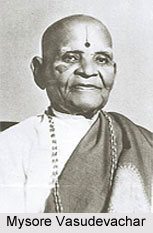 Mysore Vasudevachar was born on 28th May in the year 1865. He was a popular musician and composer of Carnatic music. He belonged to the direct line of the disciple of Tyagaraja.
Mysore Vasudevachar was born on 28th May in the year 1865. He was a popular musician and composer of Carnatic music. He belonged to the direct line of the disciple of Tyagaraja.
Life and Career of Mysore Vasudevachar
Vasudevachar was born in a family of orthodox Brahmin family in the city of Mysore and also started learning music from Veena Padmanabhiah, the chief musician of the Mysore court. He also mastered the field of Sanskrit language and allied field like Kavya, Vyakarana, Nataka, Alankaram, Tarka, Itihasa, Purana having studied at the Maharaja Sanskrit College in Mysore while learning music privately.
He then went to learn about the popular musician-composer Pathan Subramania Iyer supported by the Maharaja`s generous stipend and imbibed the music of not only his Guru but also other great maestros of the Thanjavur-Cauvery delta. Eventually, Vasudevachar became the chief court musician (Asthana Vidwan) at the Mysore court. He was also known for his Madhyama-Kala Tanam singing which he learnt from his Guru. Patnam Subramania Iyer often requested his Sishya "Vasu" to help him with the Sahitya (lyric) aspects of his compositions. This aspect of his training undoubtedly helped Vasudevachar as a composer.
Compositions of Mysore Vasudevachar
Compositions of Vasudevachar (numbering over 200) were mostly in Telugu language and Sanskrit language. Some of his most popular kritis include Brochevarevarura in Khamas raga, Devadideva in Sunadavinodini, Mamavatu Sri Saraswati in Hindolam, Bhajare Re Manasa in Abheri and Ra Ra Rajeevalochana Rama in Mohanam. He published a large number of his compositions in the book Vasudeva Kirtana Manjari. His compositions in Telugu have such sweetness and lilt, and beautifully blend with the tune of the raga as do the Sanskrit compositions, which are mellifluous. His songs reflect his mastery of Sanskrit and show his erudition and scholarship in Sanskrit literature. He considered his insight into Telugu as a gift from Tyagaraja (Tyagaraja`s bhiksha). Unlike the Dasa kuta songs, his compositions do not have any Dvaita undertones but many have the words "Paramapurusha Vasudeva" or "Vasudeva" which means the supreme Vasudeva/Lord Vishnu which incidentally is also his Mudra or signature. True to his Vaishnava heritage and the Thyagaraja shishya parampara to which he belonged, most of his compositions are in praise of Lord Rama. In addition to Kritis and Kirtan dance, he also composed Varnams, Thillanas, Javalis and slokas.
He is also credited with two writings in Kannada, one of them an autobiography called Nenapugalu (memories) and Na Kanda Kalavidaru (the musicians I have met) in which he wrote the biographies of many well known musicians.
Mysore Vasudevachar also taught in Rukmini Devi`s Kalakshetra, (founded in 1936). He was already quite old by then, but thanks to Rukmini Devi he agreed to shift to Kalakshetra. He became the chief musician in Kalakshetra and helped in setting the Ramayana to music. He died in 1961 at the age of 96. He lived a simple and austere life devoted to the study of Sanskrit and music.
S. Rajaram, his grandson worked at Kalakshetra eventually taking charge of the institution at Rukmini Devi`s request. Vasudevachar had composed the music for only the first four kandas and it was left to Rajaram to finish the work. An accomplished musician and Sanskrit scholar, he was amongst the few musicians, the sole repository of Vasudevachar`s compositions. He died on June 2, 2009.
S. Krishnamoorthy, his other grandson worked at All India Radio and has translated his grandfather`s memoirs into English. He has also published a memoir of his own.




















